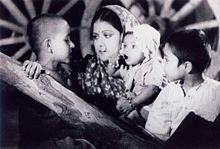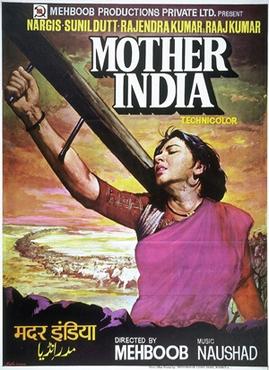
Mother India is a 1957 Indian epic drama film, directed by Mehboob Khan and starring Nargis, Sunil Dutt, Rajendra Kumar and Raaj Kumar. A remake of Khan's earlier film Aurat (1940), it is the story of a poverty-stricken village woman named Radha (Nargis), who in the absence of her husband, struggles to raise her sons and survive against a cunning money-lender amidst many troubles.
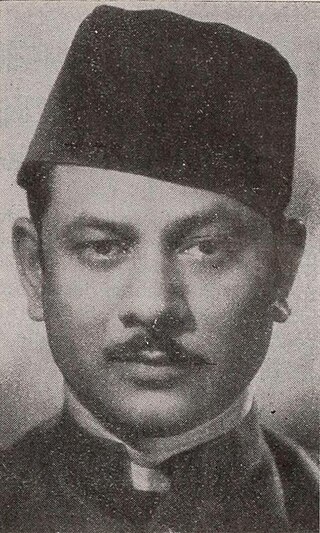
Mehboob Khan was a pioneer producer-director of Indian cinema, best known for directing the social epic Mother India (1957), which won the Filmfare Awards for Best Film and Best Director, two National Film Awards, and was a nominee for the Academy Award for Best Foreign Language Film. He set up his production company – Mehboob Productions, and later a film studio – Mehboob Studios in Bandra, Mumbai in 1954. He also created the dacoit film genre with Aurat (1940) and Mother India, and is also known for other blockbusters including the romantic drama Andaz (1949), the swashbuckling musical Aan (1951), and the melodrama Amar (1954).
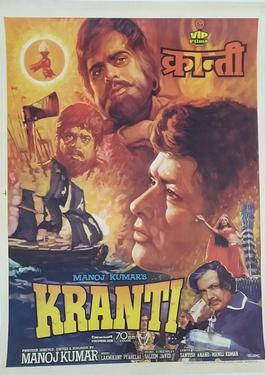
Kranti (transl. Revolution) is a 1981 Indian historical drama film, produced, edited, dialogue and directed by Manoj Kumar, with the story and screenplay written by Salim–Javed. It stars an ensemble cast, consisting of Dilip Kumar in the title role along with Manoj Kumar, Shashi Kapoor, Shatrughan Sinha, Hema Malini, Parveen Babi in pivotal roles. The film also marked the return of Dilip Kumar after a four-year hiatus. It ranks among the top 10 highest grossing Indian films of all time, when adjusted for ticket-price inflation. It was one of the most expensive Indian films of the time and it went on to become the highest grossing Indian film of the 1980s decade by a distance, when adjusted for inflation. Kranti is the biggest patriotic hit ever seen in India. It was the second highest grossing Indian film ever behind Sholay (1975) at the time of its release. However, it did higher business than Sholay in its original run. It grossed ₹20 crore as compared to ₹15 crore of Sholay in the original run. Sholay did exceptionally well in re-runs earning more profit in the meanwhile period.
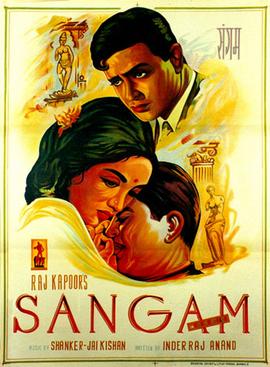
Sangam (transl. Confluence) is a 1964 Indian musical romantic drama directed, produced and edited by Raj Kapoor at R. K. Studios, written by Inder Raj Anand, and distributed by R. K. Films with Mehboob Studio and Filmistan. The film stars Kapoor, Vyjayanthimala and Rajendra Kumar in lead roles, with Iftekhar, Raj Mehra, Nana Palsikar, Lalita Pawar, Achala Sachdev and Hari Shivdasani in supporting roles. It tells the story of a pilot (Kapoor), who upon returning home from war after being assumed dead, weds the woman (Vyjayanthimala) he had long loved, unaware that she had been planning to marry his best friend (Kumar).

Ganga Jamna, also transliterated as Ganga Jamuna or Gunga Jumna, is a 1961 Indian crime drama film, written and produced by Dilip Kumar, and directed by Nitin Bose, with dialogues written by Wajahat Mirza; Kumar later said that he also ghost-directed and edited the film. It stars Dilip Kumar with Vyjayanthimala and his real-life brother Nasir Khan in the leading roles. Set in the rural Awadh region of Northern India, the film tells the story of two impoverished brothers, Ganga and Jamna, and their poignancy and sibling rivalry on opposing sides of the law, one a dacoit criminal and the other a police officer. The film was also notable for its Technicolor production, use of the Awadhi dialect, and its rustic setting, being a defining example of the dacoit film genre. It was ranked 11th in Outlook Magazine's poll considering 25 leading Indian directors' vote for Bollywood's greatest films in 2003.
Inder Raj Anand was an Indian film dialogue and screenwriter in Hindi cinema, who worked on many Raj Kapoor films, starting with Aag (1948), Aah (1953), Anari (1959) and Sangam (1963). While formally referred to as a writer for Hindi films, he was actually an Urdu writer, writing his scripts and dialogues in Urdu.

Kanhaiyalal was an Indian actor who acted in 122 films in his career, primarily in Hindi films produced in Bollywood, the Mumbai-based film industry.
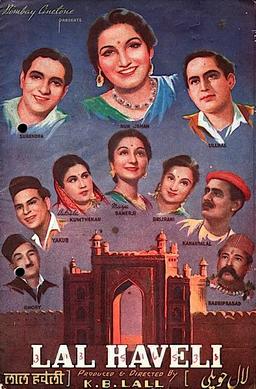
Lal Haveli is a Bollywood film. It was released on 15 December 1944. The film was directed by K. B. Lall, for whom it was a debut directorial venture. Lall had started his career playing a villain in Sohrab Modi's Bharosa (1940), and as a "storywriter" with the V. C. Desai directed film Radhika (1941), finally producing Savera (1942) directed by V. C. Desai, before turning his hand at direction with Lal Haveli.
Ek Hi Raasta is a 1939 Hindi social film directed by Mehboob Khan. The director of photography was Faredoon Irani with story by Babubhai A. Mehta and Wajahat Mirza. The film was produced by Sagar Movietone. The cast included Arun Kumar Ahuja, Sheikh Mukhtar, Anuradha, Kanhaiyalal and Harish. This was the debut film of Sheikh Mukhtar, who went on to act in and direct several successful films, and Arun Kumar Ahuja, a prominent actor in the 1940s. Ek Hi Raasta is a film about wrongs of society and its laws. It was one of the early Hindi films to make a noticeable application of WW II.
Hum Tum Aur Woh is a 1938 Hindi/Urdu social drama film. The film was directed by Mehboob Khan for Sagar Movietone. The music was composed by Anil Biswas with lyrics by Wajahat Mirza and Zia Sarhadi. The cinematographer was Faredoon Irani. The film starred Motilal, Maya Banerjee, Rose, Yakub and Sankatha Prasad. The film was a romantic triangle involving Moti (Motilal), Bina the girl he's engaged to and Leela (Rose) who is obsessed with him.

Watan (transl. Homeland) is a 1938 Hindustani costume drama film directed by Mehboob Khan. Produced by Sagar Films, the film had story by Mehboob Khan and Wajahat Mirza. The cinematographer, as for most Sagar films, was Faredoon Irani. Following the successful music of Manmohan (1936), Sagar Movietone retained Anil Biswas as the in-house music director, scoring music for Watan along with other releases of the time from the studio. The cast of the film included Kumar, Bibbo, Maya Banerjee, Yakub Lala, Sitara Devi and Kayam Ali.
Manmohan is a 1936 Indian Urdu/Hindi-language romantic tragedy film directed by Mehboob Khan. This was Khan's third film for Sagar Movietone after Al Hilal (1935) and Deccan Queen (1936). The cinematographer was Faredoon Irani who, starting from Mehboob Khan's Al Hilal (1935), went on to establish a long working relationship with him lasting till Khan's last film Son of India (1962). The music was composed by Ashok Ghosh assisted by Anil Biswas. The story writer was Zia Sarhadi who also wrote the lyrics, screenplay and dialogue in addition to acting in the film. Though he had started his writing career on Khan's backing for Deccan Queen (1936), it was with Manmohan that he achieved success. The film was inspired by Devdas, (1935), which was a big hit at the box office. Surendra was chosen as the singing star to rival K. L. Saigal from New Theatres Calcutta, whose songs from Devdas had mesmerised the nation. Though Manmohan was referred to as the "poor man's Devdas" the film went on to do well and the songs became very popular. The film starred Bibbo, Surendra, Yakub, Kayam Ali, Bhudo Advani and Mehdi Raza.

Bahen is a 1941 Hindi film directed by Mehboob Khan. Sagar Movietone had closed down at the start of WW II and reformed as National Studios. It was under the new banner that Mehboob Khan produced his three important films of that time, Aurat (1940), Bahen (1941) and Roti (1942). Written by Babubhai Mehta and Zia Sarhadi, it had dialogues and screenplay by Wajahat Mirza. The cinematography was by Faredoon Irani. Anil Biswas was the music director with lyrics by Safdar Aah. The cast included Sheikh Mukhtar, Nalini Jaywant, Harish, Kanhaiyalal, Husn Bano, Swaroop Rani, Baby Meena and Bhudo Advani.

Alibaba is a 1940 Urdu/Hindi fantasy film directed by Mehboob Khan for Sagar Movietone. The music was directed by Anil Biswas, with lyrics by Safdar Aah. The film was a bilingual, made in Punjabi language as Alibaba at the same time. It starred Surendra, Sardar Akhtar, Ghulam Mohammed and Wahidan Bai.
Grama Kanya is a 1936 Hindi melodrama film directed by Sarvottam Badami. The film produced by Sagar Movietone had cinematography by Faredoon Irani, story by Jayant Shyam and dialogue by Waqif. The music was composed by the renowned bhajan singer Shankarrao Khatu. The cast included Surendra, Sabita Devi, Yakub, Aruna, Kayam Ali, and Gulzar.

Arun Kumar Ahuja, popularly known as Aroon, was an Indian actor and producer who was active in Hindi cinema in the 1940s and early 1950s, appearing in over 30 films in both leading and supporting roles. He was married to singer and actress Nirmala Devi and is the father of actor Govinda.

Surendra was an Indian singer-actor of Hindi films. Known by his mononym, Surendra was born and educated in Punjab to be a lawyer by profession. He came to Bombay to become a singer on the recommendation of a Delhi distributor and his friends. He was "picked" by Mehboob Khan whom he met at Sagar Movietone, to sing and act in films as an alternative to the then Calcutta-based singer-actor, K. L. Saigal. Surendra started his career with his debut starring role in Deccan Queen (1936), directed by Mehboob Khan. He soon became a part of Sagar Movietone when his song "Birha Ki Aag Lagi More Man Mein" from the film became an "instant hit".
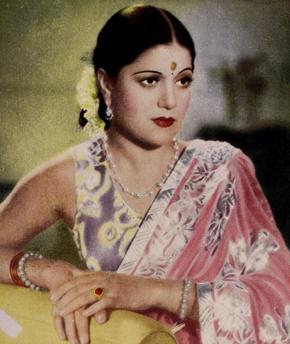
Sardar Akhtar (1915–1986) was an Indian actress who worked in Hindi and Urdu films. She started her acting career on the Urdu stage. Her early films were with Saroj Movietone, where she did a majority of stunt (action) roles. She came into prominence as the washer-woman in the role of Rami Dhoban in Sohrab Modi's Pukar (1939). As a woman seeking justice for the death of her husband, it was a breakthrough role for her. A popular song she sang in the film was "Kaheko Mohe Chhede". Her career defining role was as a "peasant woman" deserted by her husband, in Mehboob Khan's Aurat (1940), a role later made famous by Nargis in Mehboob's remake Mother India.

Sagar Movietone also Sagar Films, Sagar Film Company and Sagar Productions was an Indian film production company involved in the making of films for Indian cinema. It was launched by Ardeshir Irani with Chimanlal Desai and Dr. Ambalal Patel in 1929 in Bombay, Maharashtra, India. Sagar was initially started as a branch company of Ardeshir's Imperial Film Company. Several key figures from Imperial, such as Mehboob Khan were shifted to Sagar. The studio was in operation from 1930 to 1939. In 1940, it combined with General Pictures to form National Studios. It made "Parsi theatre based films, mythologicals and stunt movies". Sagar fostered the career of many artists who rose to prominence. Early directors such as Prafulla Ghosh, Sarvottam Badami, Ezra Mir and Nanubhai Vakil were promoted by the company. Mehboob Khan got his first break as a director in Al Hilal in 1935. He was referred to as "the most important alumnus" from Sagar, who went on to become one of Indian cinema's "most influential film-makers".

